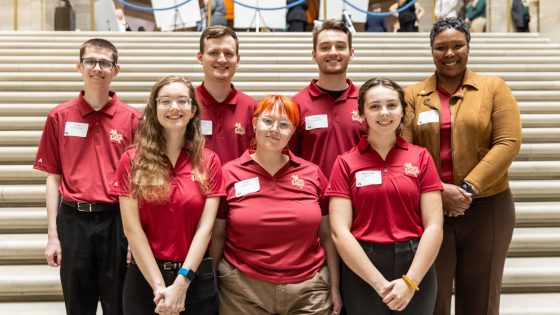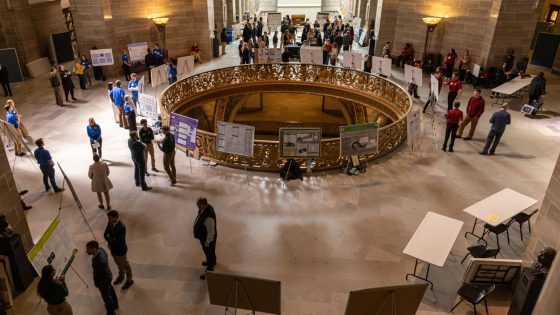A bipartisan bill to ban child marriage in Missouri won initial approval in the state Senate Wednesday afternoon.
Under current law, 16 and 17-year-olds are allowed to get married with parental consent. Marriage between a minor and anyone 21 or older is prohibited.
The legislation discussed Wednesday would prohibit issuing a marriage license to anyone younger than 18 under any circumstances.
Under identical bills co-sponsored by Republican Sen. Holly Thompson Rehder of Scott City and Democratic Sen. Lauren Arthur of Kansas City, Missouri would join 10 states that have banned child marriage.
“We’ve heard from so many people who have endured a lot of trauma as a result of getting married at a young age and often having abusive relationships, or being forced to become pregnant,” Arthur said.
“There are all kinds of individual situations that have played out as a result of child marriage,” she added, “but all of them in their own way are terrible and should be warning signs to us all, that this is no longer an acceptable standard.”
Rehder said that she got married at 15, “and so as a child that was married, I can unequivocally say that this: It’s a terrible idea and you’re not old enough to make those type of decisions.”
“…I was very alone,” Rehder said, adding that statistics bear out that child brides often face mental health issues.
There was no opposition on Wednesday. Those who have previously opposed banning child marriage often invoke parental rights or religious liberty. Last year, Sen. Mike Moon, a Republican from Ash Grove, garnered national attention when he said: “Do you know any kids who have been married at age 12? I do. And guess what? They’re still married.”
Arthur said Wednesday the bill adjusts the marriage age to align with children’s limited legal rights.
“We’re not telling someone that they can’t marry the person they love, we’re just saying that children aren’t allowed to engage in legal contracts until they’re 18,” Arthur said.
Rehder added that “all of us have stories of our great grandparents or getting married early and that was absolutely the norm. But that was before women had the opportunity that they have now. They didn’t have the opportunity for education. They didn’t have the opportunity for a professional life, like they have now.”
“…This is the one thing that can absolutely sidetrack all of that for our girls.”
Until the legislature voted to raise the minimum marriage age to 16 in 2018, Missouri had among the most lenient child marriage laws in the nation — making it an especially popular state for 15-year-olds to travel to be married.
Despite the 2018 change, Missouri law still does not align with international human rights standards, which set the minimum age at 18. Activists argued at the time Missouri’s new law would continue to leave 16 and 17-year-olds vulnerable to potential coercion.
Those in favor of a ban on child marriage often argue that marriage under 18 is coercive and can transform into forced marriage, especially because children lack the legal rights of adulthood.
Rehder said that since the 2018 change, “we got a little further, but we didn’t complete the policy process which says this is an adult decision.”
Between 2000 and 2018, 8,007 children were married in Missouri and Rehder said around 300 have been married since 2018.
The bill that won initial approval Wednesday afternoon also had a provision added by Rehder and two amendments from other senators.
Rehder’s bill, folded into this legislation, would modify fees in divorce proceedings. When one person is failing to abide by the court’s orders in divorce proceedings, that person would be the one on the line to pay the costs of returning to court.
Rehder said her former spouse was refusing to abide by the process the court decided on for divorce. She would have to pay “just to have a judge look at him and say, ‘Yes, you have to do what I’ve already told you to do.’”
“…And I’m like, you gotta be kidding me. I have to pay for that to make him do what he’s already been told to do?” Rehder said.
She said she’s heard from many women who’ve experienced domestic violence about “how this was another way of having that hold on them and making them pay more money to get away from a bad situation.”
Sen. Rick Brattin, a Republican of Harrisonville, voiced his support for this provision.
“I love the fact of kind of penalizing those that try to abuse the system,” Brattin said.
Brattin added his own amendment to the underlying bill as well.
Currently, state law says sheriffs and other law enforcement officials “may” enforce the rights of custody or visitation agreements. His amendment changes that to make it required — that they “shall” enforce those rights.
Brattin said he faced his own challenges trying to get visitation with his kids after divorce, despite a court order, and said law enforcement could deter parents from failing to abide by those agreements.
“The law enforcement shows up, well then that parent’s gonna know, ‘I’m not gonna be able to get away with this, so I do have to buck up and I have to play nice, even though I don’t want to,’” Brattin said.
Arthur also added an amendment to the bill that would add considerations for judges when determining child custody, including the child’s “physical, emotional, educational and other needs.”
The legislation still needs to receive final approval from the Senate before heading to the House, where a similar bill dealing with child marriage has yet to receive a committee hearing.
For more from our partner, click here to subscribe.




